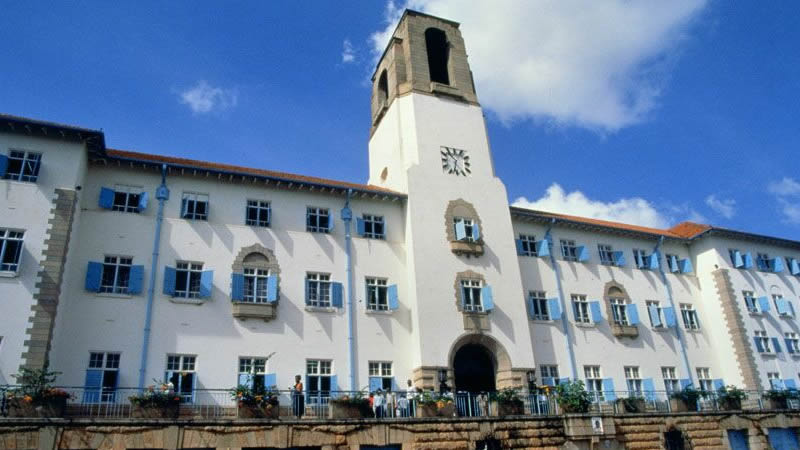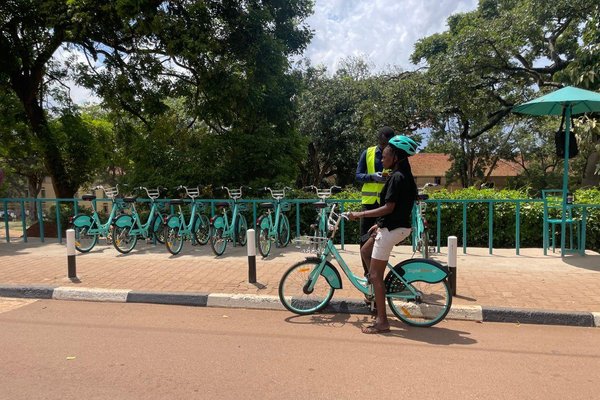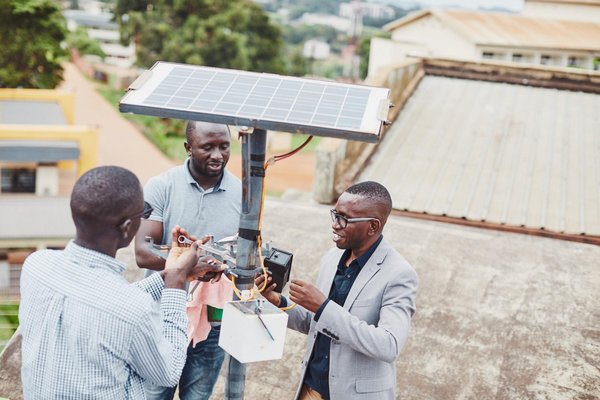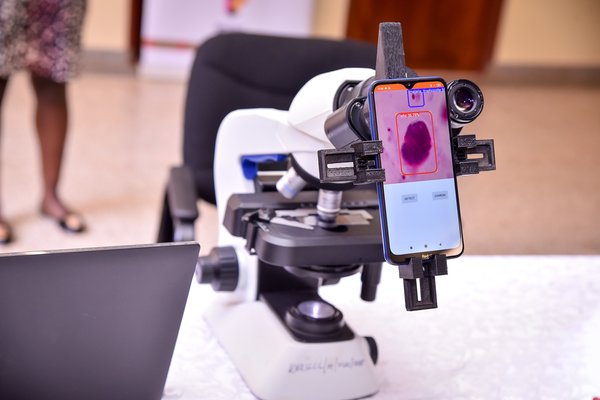By Aaron Oguttu
In a remarkable display of ingenuity and environmental consciousness, students from Makerere University’s College of Agriculture and Environmental Sciences (CAES) unveiled a groundbreaking invention that could potentially reshape the way we cook and consume energy. The solar-powered cooker aptly named the “Maksol Cooker” not only addresses the pressing need for renewable energy sources but also promises to mitigate the environmental impact of traditional cooking methods. The MakSol cooker saves energy since it gains power from the sun through the panels that channel this energy to the battery. The cooker was an output of research titled “Development, Production Scale-up and Commercialization of an Electric Solar Cooker to reduce the cooking Carbon footprint in Households”.

The MakSol Cooker, a solar powered cooker developed from the College of Agriculture and Environmental Sciences
The MakSol cooker was launched on 14th June 2023 at the School of Food Technology, Nutrition and Bioengineering Conference Hall by the Minister of Science. Technology, and innovation, Hon. Dr. Monica Musenero Masanza, represented by Dr. Cosmas Mwirikirize, the Superintendent-Industry Value Chains Development at the Science,Technology and Innovation Secretariat(STI)-Office of the President. The project was supported by the Government of Uganda through the Makerere University Research and Innovations Fund (Mak-RIF) and the science, Technology and Innovations Secretariat-Office of the President.
Up to 4 million global deaths result from Household air pollution (WHO report-2022). Furthermore, an average cook stove is reported to emit around 30 tons of Carbon Dioxide a year into the atmosphere. With its potential to transform communities and combat climate change, the MakSol cooker is poised to ignite a culinary revolution that prioritizes a greener, cleaner future.
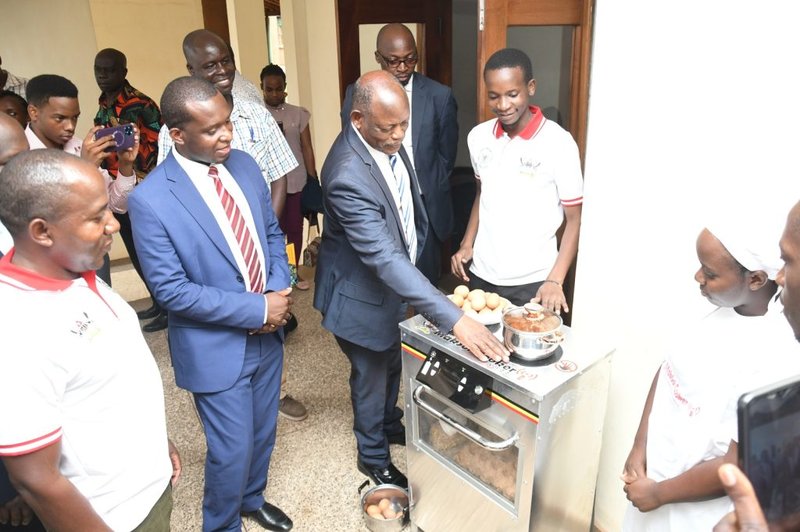
The Vice-Chancellor, Prof. Barnabas Nawangwe at the launch of the Mak Sol cooker.
According to Dr. Peter Tumutegyerize the principal investigator, a lecturer in the Department of Agricultural and Biosystems Engineering at the School of Food Science and Technology, the newly developed MakSol cooker will greatly increase access to modern zero emission cooking for off-grid communities.
How it works
Tumutegyerize elucidated that the MakSol cooker comprises the large cooking zone, small cooking zone, dashboard, cabin door, air outlet, rotary wheels, solar cable port, cooling fan air inlets and the DC bulb port. In addition to this, it has a unique 900mm cooking appliance, a sealed battery and some combination of 300Wp 18V solar panel. The solar battery is often used when encased in its ventilated chamber, housed within the cooker. The solar panels are used when positioned on the roof top and power is delivered to the cooker’s solar ports via a 10mm twin cable.
To switch on the cooker, one has to long press the power button until a beep is heard and a numeric screen and battery indicators are turned on. Each digit corresponds to a cooking zone located on that side of the cooker. There are buttons for the left and right cooking sections. Pressing any of the buttons will increase the cooking power setting, the maximum being 5. When a meal is ready, one can press power or press the button multiple times down to zero.
The MakSol cooker uses only ferromagnetic saucepans. Aluminum saucepans may not work effectively. It is also recommended that the saucepans have flat bottoms to effectively take advantage of the cooker’s entire capacity.
The MakSol cooker has a maximum charging time of seven hours, a battery life estimate of three to five years and a gross weight of 70 kgs. When fully charged, it can cook for between seven to nine hours. Tumutegyereize added that the ratio of using fuel and charcoal to emissions is 22:25 while the solar cooker only emits 1:25.Another advantage is the reduction in recurring costs involved in buying charcoal, refilling gas, electricity charges, and dealing with respiratory issues.
The cooker goes for Shs4.5 million only.
The importance of innovation
The Vice Chancellor Prof. Nawangwe was impressed by the multidisciplinary nature of the research team and involvement of students in the project. “It is important that we continuously engage students in these projects because they are the future of this country and will remain innovative for a long time,” he said at the launch. In addition to this, he emphasized the role of Makerere in Uganda's development. He appealed to the government to reverse the decision to reduce funding towards research and innovation in the next financial year.
“The future of our country lies in research and innovation, many development ideas will be crippled if funding is reduced and should instead be doubled to increase the number of innovations,” the Vice Chancellor urged. He lastly expressed gratitude to the Government of Uganda for the unwavering support towards research and innovation at Makerere. In addition to this, Prof. Barnabas appreciated the Minister of Science, Technology and Innovation, Dr. Monica Musenero for her commitment and support towards research and innovation at the University.
The Commissioner for Renewable Energy and Mineral Development, Dr. Brain Isabirye applauded Makerere University for always being at the top in research and innovation, and pledged to solicit for funding to scale up innovations at the University.
The winning team
Dr. Cosmas Mwikirize from the Science, Technology, and Innovation Secretariat (STI) applauded Dr. Peter Tumutegyereize the principal investigator and supervisor of other project members who were students including Mr. Paul Soddo who was led the team, Mrs Ayaa Filadh, Mr. Kenneth Juuko, Ms. Zebia Catherine Nankya, Ms. Cholet Atulinda at CAES for working with staff and students to develop the MakSol cooker, an innovation that promotes zero-emission cooking.
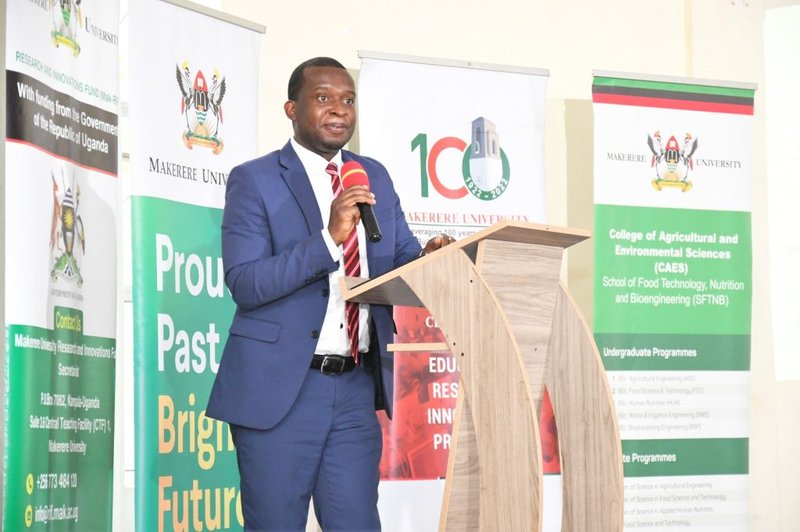
Dr. Cosmas Mwikirize a representative from the Science, Technology, and Innovation Secretariat speaking at the launch of the MaKSol cooker
In a speech delivered by Dr. Cosmas Mwikirize, the Minister Hon. Dr. Monica Musenero congratulated the research team upon reaching the huge milestone. “The solar cooker represents a breakthrough in clean cooking technology, harnessing the abundant sunlight in our region to provide sustainable, efficient and a cost effective alternative to traditional cooking methods. It eliminates the need for wood, charcoal, thereby drastically reducing the harmful emissions of particulate matter and promoting a cleaner environment for all,” she noted.
She further mentioned that the cooker was not merely a technological innovation, but a symbol of progress, resilience and sustainability, embodying the power of science, technology, and innovation in transforming society for the better. “It is a product of tireless research, collaboration, and the unwavering commitment of the talented minds and experts who have worked relentlessly to bring this innovation to life.”
In her closing remarks, the minister called on the public to embrace the technology in a bid to create a positive impact on public health, and mitigate the environmental consequences of traditional cooking practices. “The solar cooker will not only improve air quality but also alleviate the burden of deforestation and reduce the reliance on unsustainable energy sources. I would like to express my sincere gratitude to all researchers who have made this remarkable achievement possible, their dedication has paved way for a brighter and more sustainable future for our nation,” she said.
Related News
![]() Please join hands with the Makerere University Endowment Fund as it works towards attracting & retaining the best faculty, providing scholarships, and investing in cutting-edge research and technology.
Please join hands with the Makerere University Endowment Fund as it works towards attracting & retaining the best faculty, providing scholarships, and investing in cutting-edge research and technology.
